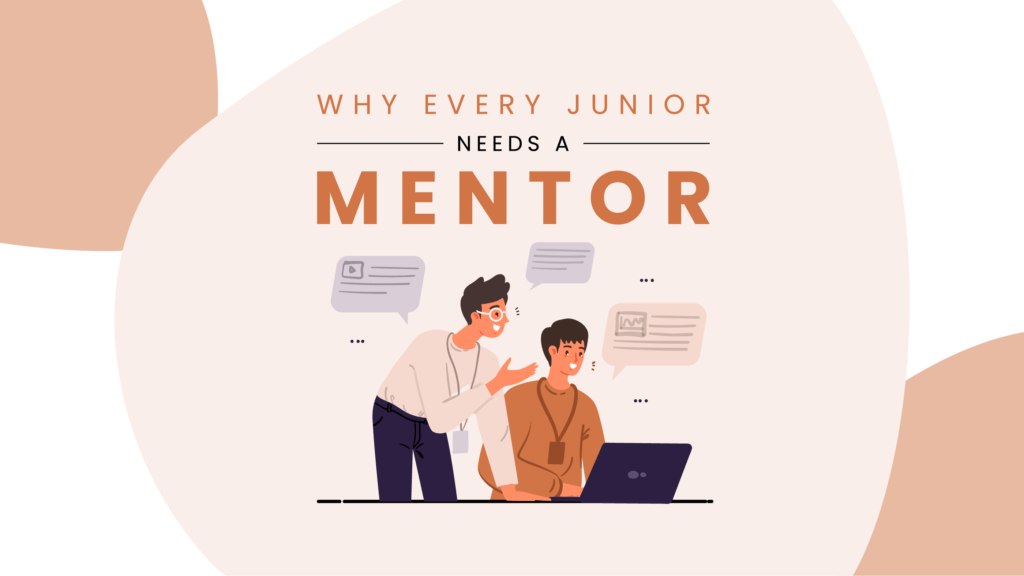Why Every Junior Software Developer Needs a Mentor

Beginning a career as a software developer can be a daunting task if you have no one to guide you. There is so much to learn in the software field about coding and applications that it often leaves a junior developer overwhelmed.
The initial days as a developer are full of struggles but are equally crucial too. This is the time when you need to work on setting your foundation right. An experienced mentor who has faced similar situations and problems in the past can make your journey comparatively easy. The mentor can guide you to the right resources, tell you what is important, and help you develop strong core skills.
A senior software developer gives you tips and best practices to write your code and systems in a maintainable fashion, making it easier for you to navigate through everyday work problems. A mentor also helps you stay focused, motivated and work towards your larger goals.
Through this article, let us embark on the journey of the mentor-mentee relationship and understand the importance of a mentor in professional life as a software developer.
Why Mentorship is Important?
The importance of mentorship in shaping the career of an entry-level employee is often underrated. However, a mentor can help a junior software developer in several ways like receiving useful coding tips, avoiding designing pitfalls, or switching to new technology. Mentorship influences a mentee’s professional growth by learning from the experience and guidance from a senior developer.
Let’s see in what all ways mentorship benefits the mentee:
1. Mentors teach how to create maintainable and sustainable code
Do you remember writing an automated framework or website for a handful of users on your computer; perhaps your college project or a demo project?
Now, suppose you are asked to implement and scale the same project into a larger system, for thousands or millions of users, which is supposed to be maintainable for multiple years. How effortlessly do you think you can do this? Is the code you wrote robust and scalable enough to incorporate changes? How easy would it be for someone to just pick up and understand your code? (While you enjoy a martini on the beach)
If you are hesitant to answer any of those questions, your code is far from being maintainable and sustainable. A code is maintainable when it is easy to read and dissect- i.e. easily locate components related to a change request. It is easy to modify without any impact on dependent modules.
In the real world, developing a sustainable and maintainable code is too complicated and only knowing the syntax and semantics of the coding language does not suffice. There are other crucial aspects of software development like design decisions and the coding best practices which you might skip for sheer lack of knowledge. Sometimes, you may end up taking shortcuts due to a technical or time constraint. However, such shortcuts or limitations may fire back turning your design decision into a bad one. And with your limited knowledge of such scenarios, you are highly likely to fall into similar situations.
A senior developer can guide you, give pointers and also review your work to check for pitfalls and help you code better. They can teach you to create modular, scalable and sustainable code. They could identify the loopholes in your code and bring your attention to them. Their intervention will enable you to keep learning something new every day and avoid repeating the same mistakes.
2. Mentors help in managing expectations
Consider your same college project. How much time did you take to complete it? A few weeks or a couple of months?
A project might have taken a few weeks in college, but an industry project generally takes a good number of months or even years for completion. Welcome to the real world!
Junior software developers are highly likely to set unrealistic deadlines for a task. They can often ignore roadblocks like meetings, colleagues going on leave, operational tasks that can hinder work, etc. They might also incorrectly identify the downstream dependabilities. What would appear as a simple change request will actually require a lot of analysis to identify the impacted modules.
Mentors can, therefore, help the mentee in setting the expectations more accurately by identifying and considering such issues beforehand.
3. Mentors enable focused learning
Do you often find yourself drowning in the pool of information available online? Do you struggle to identify authentic and legal sources of information among many bluffs?
Today, the dearth of information available on the internet has definitely made learning easier than ever. However, it has become equally challenging to decide what to learn, where to learn and how to learn.
The importance of a mentor comes into play here. A mentor can help you structure your learning, point to the right resources, give suggestions, provide ample feedback, clear your doubts and keep you focused on your area of interest.
4. Mentors help you stay motivated
Let’s admit it. We all go through a phase where we find our work either too monotonous or too overwhelming. In a junior software engineer’s life, this phase could come sooner than expected.
Often, you will find yourself swamped with grueling situations and problems which makes it difficult to stay motivated. On the contrary, you may also lose focus if a task is too repetitive and not challenging enough. But a mentor can always inspire and help you move out of such situations and get back on track.
5. Mentors carve the path to long-term professional growth
Mentorship is a lifelong relationship and the stepping stone of your professional growth. Mentors will help you expand your professional network as they are likely to connect you with relevant connections. They can help you make better career choices, refer you to future employers, and prepare you for coding interviews.
They can help you set long term goals for your career and also help you figure out your purpose.
How to Gain the Most as a Mentee
A mentor invests his time and shares his knowledge with you. Thus, as a mentee, it is your responsibility to put great effort into the mentorships. A few tips that will help you gain maximum value out of it:
- Set clear expectations from the beginning. You must be clear about what you intend to learn through this mentorship and should discuss this beforehand with your mentor.
- Always prepare yourself with important pointers before the catch-ups. This will save the mentor’s time and will also ensure you do not miss out on any important topics that you wished to discuss. Additionally, keep a shared document with the mentor where you write a summary after each catch-up and list down important points.
- Talk about challenges you face, any recent wins, and areas you'd like to work on or get their input on.
- Moreover, if you picked up anything new, a book, a course, a workshop, do bring those up too in your meetings.
- Act on the advice and ideas that your mentor shares.
- Set your goals, commit to actions, follow through with them and always keep your mentor in the loop.
Where to Find a Mentor
You now know the importance of mentorship and how you can utilise its maximum benefits. However, you might still be wondering about how and where to find a mentor. There are several places to find a mentor. But one thing you need to keep in mind while selecting a mentor is that the person should be more skilled than you, is an excellent developer and has diverse experience in terms of domains and technologies.
Few recommended ways to find your potential mentor are:
- Your current company: What better place to find a mentor than your workplace. You might already be reaching out to some of the senior software developers with your problems. If you find someone who is easily approachable, always eager to help, has clear concepts and is good with knowledge sharing, you may ask them to be your mentor. But don’t worry if you couldn’t find a mentor at your workplace, there are other ways to discover them.
- Coding conferences, workshops and tech communities: At workshops, meetups, conferences etc, there are several people ready to share their knowledge. Be open and attentive in the sessions. If you feel that your goals align with that of the speaker, try to reach out to them and establish a good relationship. Over time, this might become a mentee-mentor relationship.
- Open-source community: Find and join an open-source project community related to your technology. While contributing to this project, which can be as minute as the documentation part, you are highly likely to stumble upon your potential mentor.
- Online mentorship platforms: Nowadays you can also find some free as well as paid online mentorship platforms like Codementor, MentorCruise, etc.
The importance of mentorship not just extends to the mentee or mentor alone, but also to the company. If you want to have a rewarding career while giving your best to the organisation, you must have a learning relationship with an experienced professional in your desired field. The guidance received through such mentorship would be invaluable. By utilizing their varied knowledge and experiences, mentors can help you navigate challenges and set and achieve your goals.
Backend Technology Interview Questions
C Programming Language Interview Questions | PHP Interview Questions | .NET Core Interview Questions | NumPy Interview Questions | API Interview Questions | FastAPI Python Web Framework | Java Exception Handling Interview Questions | OOPs Interview Questions and Answers | Java Collections Interview Questions | System Design Interview Questions | Data Structure Concepts | Node.js Interview Questions | Django Interview Questions | React Interview Questions | Microservices Interview Questions | Key Backend Development Skills | Data Science Interview Questions | Python Interview Questions | Java Spring Framework Interview Questions | Spring Boot Interview Questions.
Frontend Technology Interview Questions
HTML Interview Questions | Angular Interview Questions | JavaScript Interview Questions | CSS Interview Questions.
Database Interview Questions
SQL Interview Questions | PostgreSQL Interview Questions | MongoDB Interview Questions | MySQL Interview Questions | DBMS Interview Questions.
Cloud Interview Questions
AWS Lambda Interview Questions | Azure Interview Questions | Cloud Computing Interview Questions | AWS Interview Questions.
Quality Assurance Interview Questions
Moving from Manual Testing to Automated Testing | Selenium Interview Questions | Automation Testing Interview Questions.
DevOps and Cyber Security Interview Questions
DevOps Interview Questions | How to Prevent Cyber Security Attacks | Guide to Ethical Hacking | Network Security Interview Questions.
Design Product Interview Questions
Product Manager Interview Questions | UX Designer Interview Questions.
Interview Preparation Tips
Strength and Weakness Interview Questions | I Accepted a Job Offer But Got Another Interview | Preparation Tips For the Virtual Technical Interview | 7 Tips to Improve Your GitHub Profile to Land a Job | Software Engineer Career Opportunities in Singapore | What can you expect during a whiteboard interview | How To Write A Resignation Letter | Recommendation Letter Templates and Tips.
Quick Links
Practice Skills | Best Tech Recruitment Agency in Singapore, India | Graduate Hiring | HackerTrail Litmus | Scout - Sourcing Top Tech Talent in ONE Minute | About HackerTrail | Careers | Job Openings.






Such a pertinent topic – remote onboarding makes it tough to give junior devs the right nurturing to up their game. Mentors have a key role to play.
Pretty hot topic…there is lots of ‘free wisdom’ out there, so finding the right mentor can be very tricky.